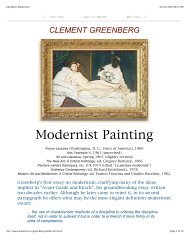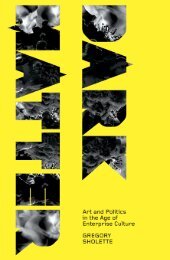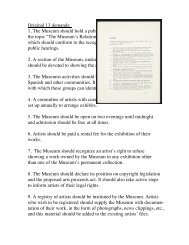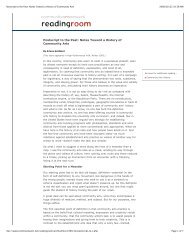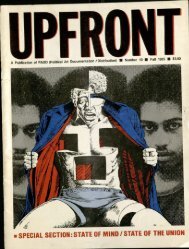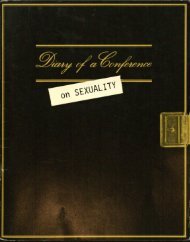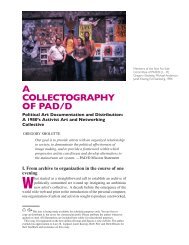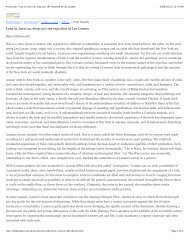The New Spirit of Capitalism - Dark Matter Archives
The New Spirit of Capitalism - Dark Matter Archives
The New Spirit of Capitalism - Dark Matter Archives
Create successful ePaper yourself
Turn your PDF publications into a flip-book with our unique Google optimized e-Paper software.
19<strong>The</strong> new capitalist deployment was greatly facilitated by critics’ silence during thisperiod <strong>of</strong> time. And to a large extent, this silence was the product <strong>of</strong> preceding displacements,on two levels at least.Social criticism, usually voiced by the principal labour unions, was disarmed by aform <strong>of</strong> change it could not interpret. It had been built in an isomorphic relationship to itsopponent, the large integrated firm. It therefore lost its ability, in the new process, to exertpressure on employers' decisions.Artistic criticism, on the other hand, lost its edge for a very different reason. Many <strong>of</strong>those who had been voicing this form <strong>of</strong> criticism at the time <strong>of</strong> the 1968 crisis had becomesatisfied with the changes that had taken place in the organisation <strong>of</strong> work and, more broadly,in society. <strong>The</strong> incorporation <strong>of</strong> many components <strong>of</strong> artistic criticism into the new spirit <strong>of</strong>capitalism had deprived earlier critics <strong>of</strong> reasons for feeling discontented – and rendered theminsensitive to the superficiality <strong>of</strong> the achievements <strong>of</strong> the so-called liberation movement.Moreover, in the Socialist era that has been France’s hallmark since 1981, many supporters <strong>of</strong>artistic criticism have been co-opted into the power elite.<strong>Capitalism</strong>’s renewed growth during the 1980s was largely due to its ability toovercome the constraints that were a part <strong>of</strong> the second spirit <strong>of</strong> capitalism, and render themobsolete. Changes in the nature <strong>of</strong> tests, and silence from disorientated critics, enabledcapitalism to spread once again, freeing it from most <strong>of</strong> the constraints that it had previouslyhad to face. One outcome <strong>of</strong> this process was that the wage/pr<strong>of</strong>it ratio again began to benefitcapital. <strong>The</strong> cost was rising inequality, precarious working conditions, and theimpoverishment <strong>of</strong> many wage earners.Worsening conditions for a great many individuals brought criticism back to life in the1990s – as shown by the wave <strong>of</strong> strikes that hit in late 1995. Criticism’s current renewal ismostly apparent in the field <strong>of</strong> social criticism, with artistic criticism remaining silent orbecoming standardised (hence inefficient). This renewal <strong>of</strong> social criticism raises the question<strong>of</strong> how new tests can be tamed and rooted in new regulations - one <strong>of</strong> the main concerns beingthe way in which flexibility can be structured. It is possible that the aim <strong>of</strong> many <strong>of</strong> themeasures that are currently being explored in France is to embed the Project-oriented Cité indevices that are stable in nature. One example is the “activity contract” (“contrat d’activité”)which, when combined with an employment contract, allows workers that a firm cannot ordoes not want to keep to seek further training or employment with a non-pr<strong>of</strong>it organisation.Of course, this is the history <strong>of</strong> France, a country characterised by almostuninterrupted Socialist rule since 1981, and therefore a society that has handed power over tothose who in 1968 had been demonstrating in the streets under the banner <strong>of</strong> artistic criticism.<strong>The</strong> history <strong>of</strong> Great Britain is a very different one, having been marked by the Thatcherrevolution. Indications are that different organisational models and spirits <strong>of</strong> capitalism willultimately prevail in each <strong>of</strong> these two countries: that they will be more market-oriented inGreat Britain (in the sense that our justificatory regime analysis lends to this term); and more“connectionist” in France.Conclusion



